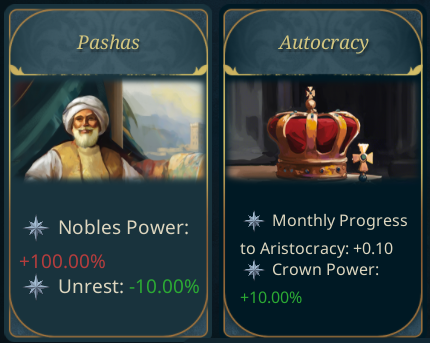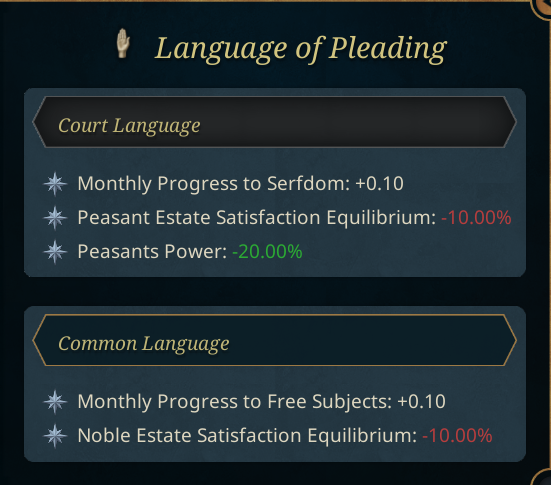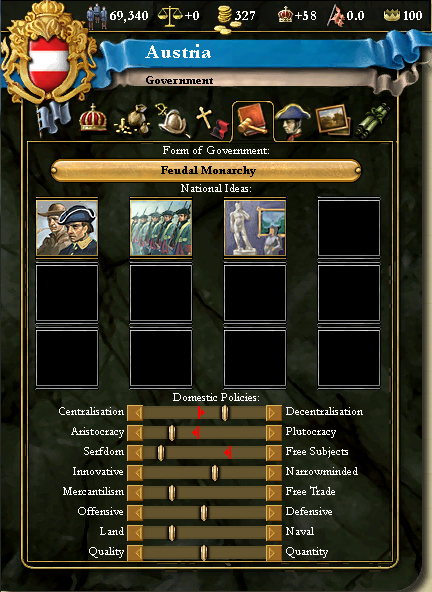欢迎来到第四期TintoTalk
政府类型
首先,游戏中有5种不同的政府类型,这在很大程度上限制了玩家可以使用的机制。例如,一个共和国无法进行皇室联姻,而草原部落与其他类型的国家相比,战争、和平与征服的机制大相径庭。

我们游戏中的一个插图……
每个国家都有一位统治者,如果没有成年的继承人,国家将可能进入摄政时期。
在凯撒计划中,对于国家政府是最具有决定性的就是阶级了,这也是游戏的核心部分之一。人口和阶级之间有着充分的联系。在保持阶级满意度的同时,保持他们较低的权力,是游戏循环的重要组成部分。在这款游戏中,阶级也是活跃的实体,如果一个阶级足够的力量,它们就会自己做事。

两项政府改革,一项针对文化,一项针对政府。

这是我测试的国家法律「诉讼语言」中的两种可用的可能性。
通常,如果您的政府允许,您可以召集议会。如果你做的不够频繁,各阶级就会开始恼怒。每次议会都有需要解决的问题,而各阶级也会有他们诉求。当然,如果您愿意接受阶级的要求,比如更改特定法律,您也可以推动议会通过您想要的东西。
政府的另一部分是内阁,随着国家的发展和进步,内阁的规模也会扩大,让你可以做更多的事情。这可以被视为 EU4 顾问和 CK2 内阁职务的混合体。
你们中有些人可能还记得EU2和EU3的国内政策。在凯撒计划中,我们以社会价值观的形式将他们重新引入。我们从这些游戏中提取了 7 种社会价值观,其中一种被一分为二,又添加了 4 种,使总数达到 13 种。社会价值观主要受到您所做的其他行为的影响,比如您在法律中选择的什么政策,又或是选择了什么改革。与我们游戏中的许多其他事情一样,这不是一个即时机制,而是一个随着时间的推移逐渐发生的变化的过程。
(注:在TintoTalk #55 中有较大改动)

哦,看,是 eu3!
Welcome to the fourth iteration of Tinto Talks!
今天,我们将为您介绍游戏中政府的不同机制。之后会有开发日志详细介绍这些内容。
Today we’ll give you an overview of the different mechanics of the Government part of the game. There will be development diaries going into much more detail for these later on.
政府类型
首先,游戏中有5种不同的政府类型,这在很大程度上限制了玩家可以使用的机制。例如,一个共和国无法进行皇室联姻,而草原部落与其他类型的国家相比,战争、和平与征服的机制大相径庭。
First of all, we have 5 different government types in the game, which determines a fair bit of what type of mechanics you get access to. As an example, a Republic does not have access to royal marriages, and a Steppe Horde has a different view on how war, peace and conquest works compared to other types of countries.
- 君主制,适用正统性
- 共和制,适用共和传统
- 神权制,适用奉献度
- 草原游牧,适用游牧团结
- 部落,适用部落凝聚力
- Monarchy, which uses Legitimacy
- Republic, which uses Republican Tradition
- Theocracy, which uses Devotion
- Steppe Horde, which Horde Unity
- Tribe, which uses Tribal Cohesion
我们游戏中的一个插图……
An illustration from our game..
这些政府体制再加上国家排名、政府改革和当地特色,就会出现「阿拉贡王冠」、「瑞典王国」、「威尔士公国」等诸如此类的国家名称。不过,并非所有国家都是基于在地图上拥有位置的国家;这在以后的开发日志中会有更多介绍。
These, together with country rank, government reform, and local flavor gives countries names like “Crown of Aragon,” “Kingdom of Sweden,” “Principality of Wales.” Not all countries are countries that are based on owning locations on a map though; more on that in later development diaries.
统治者每个国家都有一位统治者,如果没有成年的继承人,国家将可能进入摄政时期。
Each country also has a ruler, or they may be in a regency, if there are no possible adult heirs.
阶级在凯撒计划中,对于国家政府是最具有决定性的就是阶级了,这也是游戏的核心部分之一。人口和阶级之间有着充分的联系。在保持阶级满意度的同时,保持他们较低的权力,是游戏循环的重要组成部分。在这款游戏中,阶级也是活跃的实体,如果一个阶级足够的力量,它们就会自己做事。
One of the most defining parts of the government of a country in Project Caesar is the Estates mechanic. This has been one of the core parts of the game, with a full connection between the population and the estates. Keeping the estates satisfied while keeping their powers low is an important part of the gameplay loop. In this game, the Estates are also active entities and will do things on their own if they get enough power.
改革两项政府改革,一项针对文化,一项针对政府。
Two government reforms, one culture specific and one government specific.
随着时间的推移,将会出现不同的政府改革和改革时段。它们也可以基于tag、文化或宗教。
As time passes, different government reforms and reform-slots will be available. They can also be based on tag, culture or religion.
法律这是我测试的国家法律「诉讼语言」中的两种可用的可能性。
These are the two available possibilities in the Law 'Language of Pleading' for the country I tested.
除了改革以外我们还有法律。一项法律可以有多种不同的政策供您选择,并且一些法律具有仅适用于某些tag、宗教、文化、政府类型或其他因素的独特政策。
Something that is different from a reform is what we call a Law. A Law can have several different policies you can pick from, and several laws have unique policies only available to certain tags, religions, cultures, government types or other factors.
不过,增加新的改革或政策也有一些缺点,因为它需要几年的时间才能完全发挥作用,具体取决于您所在国家/地区的行政效率。 (是的,这又是另一个游戏中其他事物的名称,但它适合这里。)
There are some drawbacks to adding new reforms or policies though, as it takes a few years for it to have full effect, depending on your country's administrative efficiency. (Yes, it's a name for something else in another game, but it fits here.)
议会通常,如果您的政府允许,您可以召集议会。如果你做的不够频繁,各阶级就会开始恼怒。每次议会都有需要解决的问题,而各阶级也会有他们诉求。当然,如果您愿意接受阶级的要求,比如更改特定法律,您也可以推动议会通过您想要的东西。
Regularly, if your government allows it, you can call in a Parliament. If you don’t do it often enough the estates will start to get irritated, but each parliament has issues that need to be resolved, and the estates will have agendas they want done for their support. Of course, you also have options to push through what you want from a parliament, if you are willing to accept the demands of the estate, like changing a particular law.
内阁政府的另一部分是内阁,随着国家的发展和进步,内阁的规模也会扩大,让你可以做更多的事情。这可以被视为 EU4 顾问和 CK2 内阁职务的混合体。
Another part of the government is the cabinet, which also grows in size as you become more advanced, allowing you to do more things. This is something that can be viewed as a hybrid between EU4 Advisors and the CK2 council actions.
社会价值观你们中有些人可能还记得EU2和EU3的国内政策。在凯撒计划中,我们以社会价值观的形式将他们重新引入。我们从这些游戏中提取了 7 种社会价值观,其中一种被一分为二,又添加了 4 种,使总数达到 13 种。社会价值观主要受到您所做的其他行为的影响,比如您在法律中选择的什么政策,又或是选择了什么改革。与我们游戏中的许多其他事情一样,这不是一个即时机制,而是一个随着时间的推移逐渐发生的变化的过程。
(注:在TintoTalk #55 中有较大改动)
Some of you may remember the domestic policies from EU2 and EU3. In Project Caesar we are bringing the idea back in the form of Societal Values. There are seven that we took from these games, one that was split in two, and we added four new ones, bringing the total to 13 different Societal Values. Societal Values are primarily affected by what other actions you do, like what policies you pick in a law, or what reforms you pick. As with so many other things in our game, this is not an instant action, but a gradual change over time.
哦,看,是 eu3!
oh look, its eu3!
下周,我们将详细介绍阶级与其运作方式。
Next week, we will go into much more detail about estates and how they work.
最后编辑: